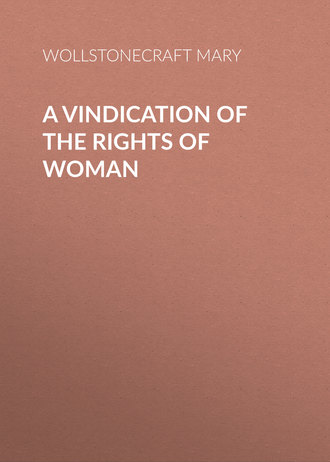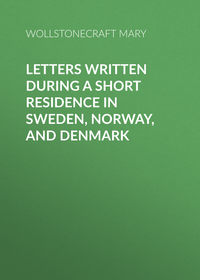 полная версия
полная версияA Vindication of the Rights of Woman
Wishing to feed the affections with what is now the food of vanity, I would fain persuade my sex to act from simpler principles. Let them merit love, and they will obtain it, though they may never be told that: "The power of a fine woman over the hearts of men, of men of the finest parts, is even beyond what she conceives."
I have already noticed the narrow cautions with respect to duplicity, female softness, delicacy of constitution; for these are the changes which he rings round without ceasing, in a more decorous manner, it is true, than Rousseau; but it all comes home to the same point, and whoever is at the trouble to analyze these sentiments, will find the first principles not quite so delicate as the superstructure.
The subject of amusements is treated in too cursory a manner; but with the same spirit.
When I treat of friendship, love, and marriage, it will be found that we materially differ in opinion; I shall not then forestall what I have to observe on these important subjects; but confine my remarks to the general tenor of them, to that cautious family prudence, to those confined views of partial unenlightened affection, which exclude pleasure and improvement, by vainly wishing to ward off sorrow and error—and by thus guarding the heart and mind, destroy also all their energy. It is far better to be often deceived than never to trust; to be disappointed in love, than never to love; to lose a husband's fondness, than forfeit his esteem.
Happy would it be for the world, and for individuals, of course, if all this unavailing solicitude to attain worldly happiness, on a confined plan, were turned into an anxious desire to improve the understanding. "Wisdom is the principal thing: THEREFORE get wisdom; and with all thy gettings get understanding." "How long ye simple ones, will ye love simplicity, and hate knowledge?" Saith Wisdom to the daughters of men!
SECTION 5.4
I do not mean to allude to all the writers who have written on the subject of female manners—it would in fact be only beating over the old ground, for they have, in general, written in the same strain; but attacking the boasted prerogative of man—the prerogative that may emphatically be called the iron sceptre of tyranny, the original sin of tyrants, I declare against all power built on prejudices, however hoary.
If the submission demanded be founded on justice—there is no appealing to a higher power—for God is justice itself. Let us then, as children of the same parent, if not bastardized by being the younger born, reason together, and learn to submit to the authority of reason when her voice is distinctly heard. But, if it be proved that this throne of prerogative only rests on a chaotic mass of prejudices, that have no inherent principle of order to keep them together, or on an elephant, tortoise, or even the mighty shoulders of a son of the earth, they may escape, who dare to brave the consequence without any breach of duty, without sinning against the order of things.
Whilst reason raises man above the brutal herd, and death is big with promises, they alone are subject to blind authority who have no reliance on their own strength. "They are free who will be free!"5
The being who can govern itself, has nothing to fear in life; but if any thing is dearer than its own respect, the price must be paid to the last farthing. Virtue, like every thing valuable, must be loved for herself alone; or she will not take up her abode with us. She will not impart that peace, "which passeth understanding," when she is merely made the stilts of reputation and respected with pharisaical exactness, because "honesty is the best policy."
That the plan of life which enables us to carry some knowledge and virtue into another world, is the one best calculated to ensure content in this, cannot be denied; yet few people act according to this principle, though it be universally allowed that it admits not of dispute. Present pleasure, or present power, carry before it these sober convictions; and it is for the day, not for life, that man bargains with happiness. How few! how very few! have sufficient foresight or resolution, to endure a small evil at the moment, to avoid a greater hereafter.
Woman in particular, whose virtue6 is built on mutual prejudices, seldom attains to this greatness of mind; so that, becoming the slave of her own feelings, she is easily subjugated by those of others. Thus degraded, her reason, her misty reason! is employed rather to burnish than to snap her chains.
Indignantly have I heard women argue in the same track as men, and adopt the sentiments that brutalize them with all the pertinacity of ignorance.
I must illustrate my assertion by a few examples. Mrs. Piozzi, who often repeated by rote, what she did not understand, comes forward with Johnsonian periods.
"Seek not for happiness in singularity; and dread a refinement of wisdom as a deviation into folly." Thus she dogmatically addresses a new married man; and to elucidate this pompous exordium, she adds, "I said that the person of your lady would not grow more pleasing to you, but pray let her never suspect that it grows less so: that a woman will pardon an affront to her understanding much sooner than one to her person, is well known; nor will any of us contradict the assertion. All our attainments, all our arts, are employed to gain and keep the heart of man; and what mortification can exceed the disappointment, if the end be not obtained: There is no reproof however pointed, no punishment however severe, that a woman of spirit will not prefer to neglect; and if she can endure it without complaint, it only proves that she means to make herself amends by the attention of others for the slights of her husband!"
These are true masculine sentiments. "All our ARTS are employed to gain and keep the heart of man:"—and what is the inference?—if her person, and was there ever a person, though formed with Medicisan symmetry, that was not slighted? be neglected, she will make herself amends by endeavouring to please other men. Noble morality! But thus is the understanding of the whole sex affronted, and their virtue deprived of the common basis of virtue. A woman must know, that her person cannot be as pleasing to her husband as it was to her lover, and if she be offended with him for being a human creature, she may as well whine about the loss of his heart as about any other foolish thing. And this very want of discernment or unreasonable anger, proves that he could not change his fondness for her person into affection for her virtues or respect for her understanding.
Whilst women avow, and act up to such opinions, their understandings, at least, deserve the contempt and obloquy that men, WHO NEVER insult their persons, have pointedly levelled at the female mind. And it is the sentiments of these polite men, who do not wish to be encumbered with mind, that vain women thoughtlessly adopt. Yet they should know, that insulted reason alone can spread that SACRED reserve about the persons which renders human affections, for human affections have always some base alloy, as permanent as is consistent with the grand end of existence—the attainment of virtue.
The Baroness de Stael speaks the same language as the lady just cited, with more enthusiasm. Her eulogium on Rousseau was accidentally put into my hands, and her sentiments, the sentiments of too many of my sex, may serve as the text for a few comments. "Though Rousseau," she observes, "has endeavoured to prevent women from interfering in public affairs, and acting a brilliant part in the theatre of politics; yet, in speaking of them, how much has he done it to their satisfaction! If he wished to deprive them of some rights, foreign to their sex, how has he for ever restored to them all those to which it has a claim! And in attempting to diminish their influence over the deliberations of men, how sacredly has he established the empire they have over their happiness! In aiding them to descend from an usurped throne, he has firmly seated them upon that to which they were destined by nature; and though he be full of indignation against them when they endeavour to resemble men, yet when they come before him with all THE CHARMS WEAKNESSES, VIRTUES, and ERRORS, OF their sex, his respect for their PERSONS amounts almost to adoration." True!—For never was there a sensualist who paid more fervent adoration at the shrine of beauty. So devout, indeed, was his respect for the person, that excepting the virtue of chastity, for obvious reasons, he only wished to see it embellished by charms, weaknesses, and errors. He was afraid lest the austerity of reason should disturb the soft playfulness of love. The master wished to have a meretricious slave to fondle, entirely dependent on his reason and bounty; he did not want a companion, whom he should be compelled to esteem, or a friend to whom he could confide the care of his children's education, should death deprive them of their father, before he had fulfilled the sacred task. He denies woman reason, shuts her out from knowledge, and turns her aside from truth; yet his pardon is granted, because, "he admits the passion of love." It would require some ingenuity to show why women were to be under such an obligation to him for thus admitting love; when it is clear that he admits it only for the relaxation of men, and to perpetuate the species; but he talked with passion, and that powerful spell worked on the sensibility of a young encomiast. "What signifies it," pursues this rhapsodist, "to women, that his reason disputes with them the empire, when his heart is devotedly theirs." It is not empire—but equality, that they should contend for. Yet, if they only wished to lengthen out their sway, they should not entirely trust to their persons, for though beauty may gain a heart, it cannot keep it, even while the beauty is in full bloom, unless the mind lend, at least, some graces.
When women are once sufficiently enlightened to discover their real interest, on a grand scale, they will, I am persuaded, be very ready to resign all the prerogatives of love, that are not mutual, (speaking of them as lasting prerogatives,) for the calm satisfaction of friendship, and the tender confidence of habitual esteem. Before marriage they will not assume any insolent airs, nor afterward abjectly submit; but, endeavouring to act like reasonable creatures, in both situations, they will not be tumbled from a throne to a stool.
Madame Genlis has written several entertaining books for children; and her letters on Education afford many useful hints, that sensible parents will certainly avail themselves of; but her views are narrow, and her prejudices as unreasonable as strong.
I shall pass over her vehement argument in favour of the eternity of future punishments, because I blush to think that a human being should ever argue vehemently in such a cause, and only make a few remarks on her absurd manner of making the parental authority supplant reason. For every where does she inculcate not only BLIND submission to parents; but to the opinion of the world.7
She tells a story of a young man engaged by his father's express desire to a girl of fortune. Before the marriage could take place she is deprived of her fortune, and thrown friendless on the world. The father practises the most infamous arts to separate his son from her, and when the son detects his villany, and, following the dictates of honour, marries the girl, nothing but misery ensues, because forsooth he married WITHOUT his father's consent. On what ground can religion or morality rest, when justice is thus set at defiance? In the same style she represents an accomplished young woman, as ready to marry any body that her MAMMA pleased to recommend; and, as actually marrying the young man of her own choice, without feeling any emotions of passion, because that a well educated girl had not time to be in love. Is it possible to have much respect for a system of education that thus insults reason and nature?
Many similar opinions occur in her writings, mixed with sentiments that do honour to her head and heart. Yet so much superstition is mixed with her religion, and so much worldly wisdom with her morality, that I should not let a young person read her works, unless I could afterwards converse on the subjects, and point out the contradictions.
Mrs. Chapone's Letters are written with such good sense, and unaffected humility, and contain so many useful observations, that I only mention them to pay the worthy writer this tribute of respect. I cannot, it is true, always coincide in opinion with her; but I always respect her.
The very word respect brings Mrs. Macaulay to my remembrance. The woman of the greatest abilities, undoubtedly, that this country has ever produced. And yet this woman has been suffered to die without sufficient respect being paid to her memory.
Posterity, however, will be more just; and remember that Catharine Macaulay was an example of intellectual acquirements supposed to be incompatible with the weakness of her sex. In her style of writing, indeed, no sex appears, for it is like the sense it conveys, strong and clear.
I will not call her's a masculine understanding, because I admit not of such an arrogant assumption of reason; but I contend that it was a sound one, and that her judgment, the matured fruit of profound thinking, was a proof that a woman can acquire judgment, in the full extent of the word. Possessing more penetration than sagacity, more understanding than fancy, she writes with sober energy, and argumentative closeness; yet sympathy and benevolence give an interest to her sentiments, and that vital heat to arguments, which forces the reader to weigh them.*
When I first thought of writing these strictures I anticipated Mrs. Macaulay's approbation with a little of that sanguine ardour which it has been the business of my life to depress; but soon heard with the sickly qualm of disappointed hope, and the still seriousness of regret—that she was no more!
SECTION 5.5
Taking a view of the different works which have been written on education, Lord Chesterfield's Letters must not be silently passed over. Not that I mean to analyze his unmanly, immoral system, or even to cull any of the useful shrewd remarks which occur in his frivolous correspondence—No, I only mean to make a few reflections on the avowed tendency of them—the art of acquiring an early knowledge of the world. An art, I will venture to assert, that preys secretly, like the worm in the bud, on the expanding powers, and turns to poison the generous juices which should mount with vigour in the youthful frame, inspiring warm affections and great resolves.
For every thing, saith the wise man, there is reason; and who would look for the fruits of autumn during the genial months of spring? But this is mere declamation, and I mean to reason with those worldly-wise instructors, who, instead of cultivating the judgment, instil prejudices, and render hard the heart that gradual experience would only have cooled. An early acquaintance with human infirmities; or, what is termed knowledge of the world, is the surest way, in my opinion, to contract the heart and damp the natural youthful ardour which produces not only great talents, but great virtues. For the vain attempt to bring forth the fruit of experience, before the sapling has thrown out its leaves, only exhausts its strength, and prevents its assuming a natural form; just as the form and strength of subsiding metals are injured when the attraction of cohesion is disturbed. Tell me, ye who have studied the human mind, is it not a strange way to fix principles by showing young people that they are seldom stable? And how can they be fortified by habits when they are proved to be fallacious by example? Why is the ardour of youth thus to be damped, and the luxuriancy of fancy cut to the quick? This dry caution may, it is true, guard a character from worldly mischances; but will infallibly preclude excellence in either virtue or knowledge. The stumbling-block thrown across every path by suspicion, will prevent any vigorous exertions of genius or benevolence, and life will be stripped of its most alluring charm long before its calm evening, when man should retire to contemplation for comfort and support.
A young man who has been bred up with domestic friends, and led to store his mind with as much speculative knowledge as can be acquired by reading and the natural reflections which youthful ebullitions of animal spirits and instinctive feelings inspire, will enter the world with warm and erroneous expectations. But this appears to be the course of nature; and in morals, as well as in works of taste, we should be observant of her sacred indications, and not presume to lead when we ought obsequiously to follow.
In the world few people act from principle; present feelings, and early habits, are the grand springs: but how would the former be deadened, and the latter rendered iron corroding fetters, if the world were shown to young people just as it is; when no knowledge of mankind or their own hearts, slowly obtained by experience rendered them forbearing? Their fellow creatures would not then be viewed as frail beings; like themselves, condemned to struggle with human infirmities, and sometimes displaying the light and sometimes the dark side of their character; extorting alternate feelings of love and disgust; but guarded against as beasts of prey, till every enlarged social feeling, in a word—humanity, was eradicated.
In life, on the contrary, as we gradually discover the imperfections of our nature, we discover virtues, and various circumstances attach us to our fellow creatures, when we mix with them, and view the same objects, that are never thought of in acquiring a hasty unnatural knowledge of the world. We see a folly swell into a vice, by almost imperceptible degrees, and pity while we blame; but, if the hideous monster burst suddenly on our sight, fear and disgust rendering us more severe than man ought to be, might lead us with blind zeal to usurp the character of omnipotence, and denounce damnation on our fellow mortals, forgetting that we cannot read the heart, and that we have seeds of the same vices lurking in our own.
I have already remarked, that we expect more from instruction, than mere instruction can produce: for, instead of preparing young people to encounter the evils of life with dignity, and to acquire wisdom and virtue by the exercise of their own faculties, precepts are heaped upon precepts, and blind obedience required, when conviction should be brought home to reason.
Suppose, for instance, that a young person in the first ardour of friendship deifies the beloved object—what harm can arise from this mistaken enthusiastic attachment? Perhaps it is necessary for virtue first to appear in a human form to impress youthful hearts; the ideal model, which a more matured and exalted mind looks up to, and shapes for itself, would elude their sight. He who loves not his brother whom he hath seen, how can he love God? asked the wisest of men.
It is natural for youth to adorn the first object of its affection with every good quality, and the emulation produced by ignorance, or, to speak with more propriety, by inexperience, brings forward the mind capable of forming such an affection, and when, in the lapse of time, perfection is found not to be within the reach of mortals, virtue, abstractly, is thought beautiful, and wisdom sublime. Admiration then gives place to friendship, properly so called, because it is cemented by esteem; and the being walks alone only dependent on heaven for that emulous panting after perfection which ever glows in a noble mind. But this knowledge a man must gain by the exertion of his own faculties; and this is surely the blessed fruit of disappointed hope! for He who delighteth to diffuse happiness and show mercy to the weak creatures, who are learning to know him, never implanted a good propensity to be a tormenting ignis fatuus.
Our trees are now allowed to spread with wild luxuriance, nor do we expect by force to combine the majestic marks of time with youthful graces; but wait patiently till they have struck deep their root, and braved many a storm. Is the mind then, which, in proportion to its dignity advances more slowly towards perfection, to be treated with less respect? To argue from analogy, every thing around us is in a progressive state; and when an unwelcome knowledge of life produces almost a satiety of life, and we discover by the natural course of things that all that is done under the sun is vanity, we are drawing near the awful close of the drama. The days of activity and hope are over, and the opportunities which the first stage of existence has afforded of advancing in the scale of intelligence, must soon be summed up. A knowledge at this period of the futility of life, or earlier, if obtained by experience, is very useful, because it is natural; but when a frail being is shown the follies and vices of man, that he may be taught prudently to guard against the common casualties of life by sacrificing his heart—surely it is not speaking harshly to call it the wisdom of this world, contrasted with the nobler fruit of piety and experience.
I will venture a paradox, and deliver my opinion without reserve; if men were only born to form a circle of life and death, it would be wise to take every step that foresight could suggest to render life happy. Moderation in every pursuit would then be supreme wisdom; and the prudent voluptuary might enjoy a degree of content, though he neither cultivated his understanding nor kept his heart pure. Prudence, supposing we were mortal, would be true wisdom, or, to be more explicit, would procure the greatest portion of happiness, considering the whole of life; but knowledge beyond the conveniences of life would be a curse.
Why should we injure our health by close study? The exalted pleasure which intellectual pursuits afford would scarcely be equivalent to the hours of languor that follow; especially, if it be necessary to take into the reckoning the doubts and disappointments that cloud our researches. Vanity and vexation close every inquiry: for the cause which we particularly wished to discover flies like the horizon before us as we advance. The ignorant, on the contrary, resemble children, and suppose, that if they could walk straight forward they should at last arrive where the earth and clouds meet. Yet, disappointed as we are in our researches, the mind gains strength by the exercise, sufficient, perhaps, to comprehend the answers which, in another step of existence, it may receive to the anxious questions it asked, when the understanding with feeble wing was fluttering round the visible effects to dive into the hidden cause.
The passions also, the winds of life, would be useless, if not injurious, did the substance which composes our thinking being, after we have thought in vain, only become the support of vegetable life, and invigorate a cabbage, or blush in a rose. The appetites would answer every earthly purpose, and produce more moderate and permanent happiness. But the powers of the soul that are of little use here, and, probably, disturb our animal enjoyments, even while conscious dignity makes us glory in possessing them, prove that life is merely an education, a state of infancy, of which the only hopes worth cherishing should not be sacrificed. I mean, therefore to infer, that we ought to have a precise idea of what we wish to attain by education, for the immortality of the soul is contradicted by the actions of many people, who firmly profess the belief.
If you mean to secure ease and prosperity on earth as the first consideration, and leave futurity to provide for itself, you act prudently in giving your child an early insight into the weaknesses of his nature. You may not, it is true, make an Inkle of him; but do not imagine that he will stick to more than the letter of the law, who has very early imbibed a mean opinion of human nature; nor will he think it necessary to rise much above the common standard. He may avoid gross vices, because honesty is the best policy; but he will never aim at attaining great virtues. The example of writers and artists will illustrate this remark.
I must therefore venture to doubt, whether what has been thought an axiom in morals, may not have been a dogmatical assertion made by men who have coolly seen mankind through the medium of books, and say, in direct contradiction to them, that the regulation of the passions is not always wisdom. On the contrary, it should seem, that one reason why men have superiour judgment and more fortitude than women, is undoubtedly this, that they give a freer scope to the grand passions, and by more frequently going astray, enlarge their minds. If then by the exercise of their own reason, they fix on some stable principle, they have probably to thank the force of their passions, nourished by FALSE views of life, and permitted to overleap the boundary that secures content. But if, in the dawn of life, we could soberly survey the scenes before us as in perspective, and see every thing in its true colours, how could the passions gain sufficient strength to unfold the faculties?






